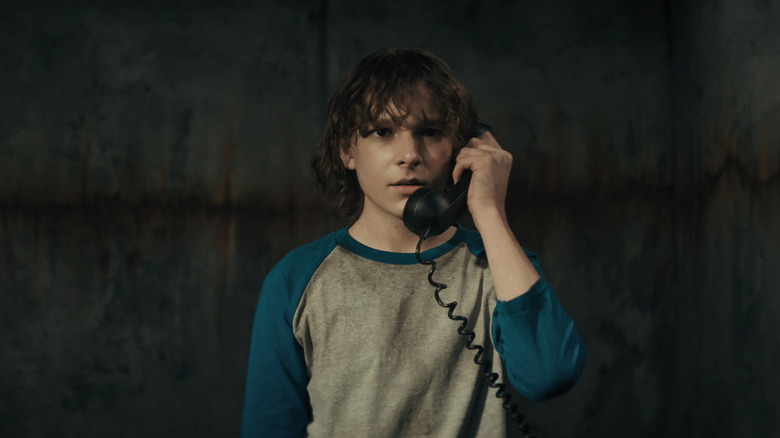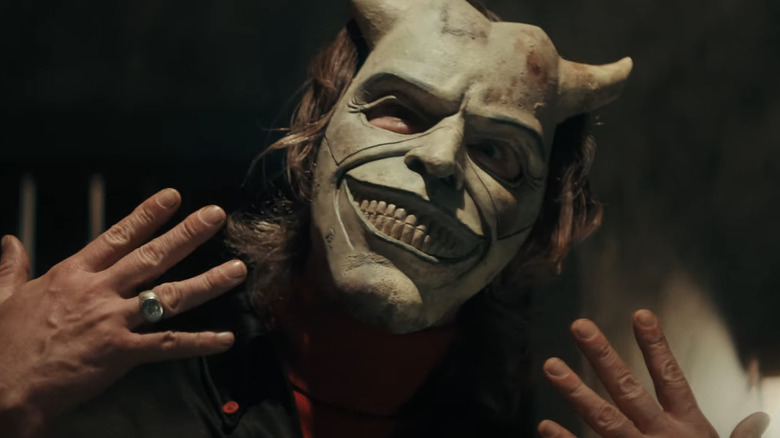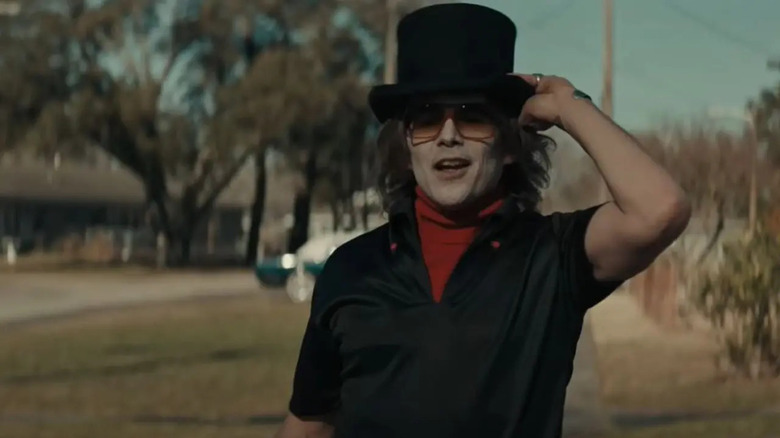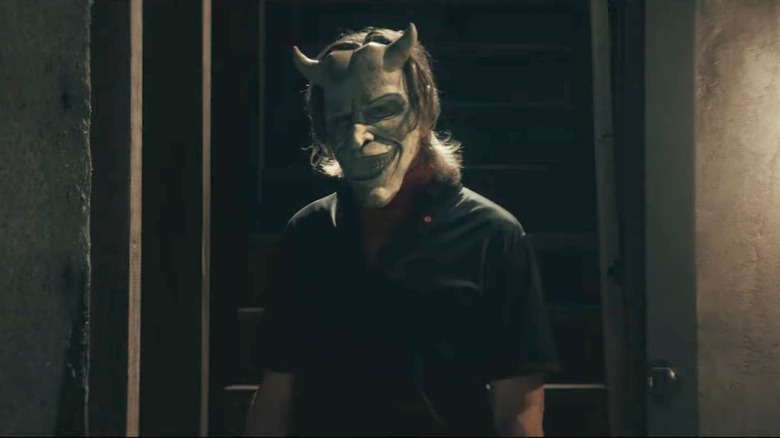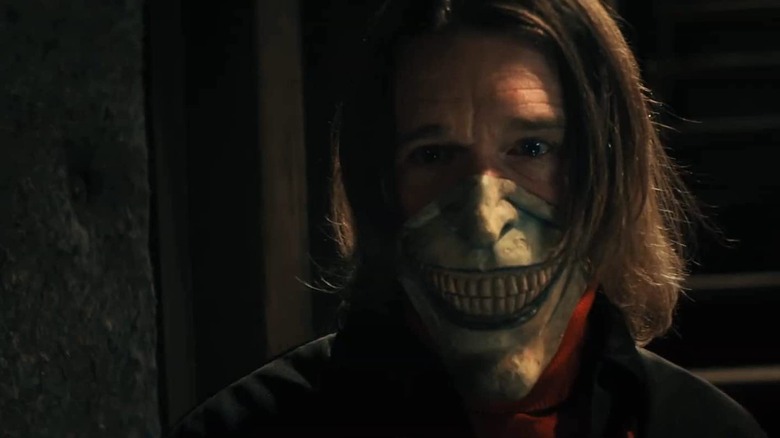The Black Phone Author Joe Hill On Why Scott Derrickson Reminds Him Of William Friedkin [Interview]
My number one goal when speaking with Joe Hill is to not bring up his father. After all, Hill has carved out a massively successful career as a novelist and comic book writer, penning books like "Horns," "NOS4A2," and "The Fireman" as well as comic series like "Locke and Key." He's his own man, his own singular talent, and has long escaped being compared to his dad, a horror writer you may have heard of named Stephen King. But a few minutes into our conversation, Hill himself brings it up and clears the air: Yes, he's a Stephen King fan, and yes, reading "It" when he was a youngster was a transformative experience for him. Like nearly every single writer currently telling horror stories in the 21st century, Hill owes something to King. His connection is a just a bit more direct.
And while Hill is no stranger to his work being adapted ("NOS4A2" on AMC, "Locke and Key" on Netflix," "Horns" on the big screen), the latest adaptation of his work is the best yet. "The Black Phone" takes Hill's 20-page short story from the collection "20th Century Ghosts" and expands upon its straightforward premise. Director Scott Derrickson and writer C. Robert Cargill kept Hill fully in the loop as they transformed the story of a young man, his terrifying abductor, and the supernatural phone that allows him to speak to the dead into one of the best horror movies of the year.
I recently sat down with Hill over Zoom to discuss "The Black Phone," the terrifying basement that inspired the story, his own struggles (and triumphs) as a writer, and why Derrickson's filmmaking reminds him of a certain '70s legend.
'I saw it probably the first time when I was 10 years old, and 20 years later, it was still in my head waiting for its moment'
How are you doing today?
I'm doing really well. I've been sort of resisting the urge to go like this into the camera [leans toward his screen], see if I have anything in my teeth, because I was having chocolate cake just before I started these interviews. But then the interviews get rolling and it's too late, so I've done a certain amount of talking like this...
Before you started getting involved in film and TV adaptations of your work, how common were these press days? Did you have to do a lot of press days like this when you were just quietly writing books and stories?
When my first novel came out, I got to go on "Good Morning America," and I had a day of — back in those days, there was more money in publishing, and they sent me for a day of press training. So I did a whole day of media training, and the only thing I remember from it, my only takeaway was not to eat blackberries before you go on TV, because if you eat blackberries before you go on TV, you inevitably get this weird black seed between two teeth and that's all anyone can see when they see you on TV. And that's pretty much it.
There does tend to be, for a film or TV show, these kind of media days where you get out and you beat the drum hard. A little less so for books, but you do some press for the books, too. Sometimes you'll do a whole string of radio spots or something like that. I'm not sure I'm real good at it, but I'm always game. Maybe I'll get better. Who knows?
I remember I saw you when they premiered the first episode of "NOS4A2" at SXSW. I was in the audience for that, and I remember you were on the panel. I think you're a natural. I think you should give yourself credit. You're good at this.
Well, thank you.
So let's jump in with the cliche. I want to talk about the beginning. Do you remember the origin of "The Black Phone" as a short story, where it came from, the seed of it when you first wrote it?
Yeah, yeah. This was tough, because this is a story I wrote 20 years ago, almost 20 years ago in 2003, 2004, something like that. So it was a real struggle to remember. I'm like, who remembers what they were doing 20 years ago? I thought about it a bit and it seems to me ... so I grew up in Bangor, Maine, and my family lived in a beautiful old Victorian, and the basement was a maze. It was dirt floor, and it was a maze of twisty cement corridors and low-hanging pipes and cobwebs and antiques. Your basic horror movie basement, you know? And there was, in one part of the basement, there was an antique phone which was not connected to anything, and that phone waited for me to get old enough to write a story about it. I saw it probably the first time when I was 10 years old, and 20 years later, it was still in my head waiting for its moment.
'It's an awful lot of fun for something that goes to such grim places'
So at what point did you realize that this was a story about a child abductor? I'm curious what your creative process is like.
Well, it's tougher to ... again, we're talking about a story I wrote a long time ago, so it's tough to remember specifically about "The Black Phone." I know that when I wrote it I was a failed novelist, that I had written four novels that I couldn't sell for love or money, and I'd mostly given up on the idea of being a novelist. I had learned to write short stories, and I had started to write some good ones. On the strength of one of those short stories, I got a chance to write an issue of Spider-Man for Marvel Comics, and I think I was sort of angling for a career in comic books at that point.
But I did think, "Well, I do have these short stories and it would be great to collect them all under one roof, so maybe I should try to sell a collection." And also, I took pleasure in just being able to write a story and knowing I can do this well. Maybe I have no idea how to write a novel, but I can do this one thing well. And so I did start to write a string of short stories. "Abraham's Boys" was one, that was a story about the children of Abraham Van Helsing growing up in America under the shadow of a man who was badly deranged by his experience fighting vampires. I wrote "My Father's Mask," which is a story about a family taking a vacation in their lake house, and the lake house, at certain moments during the year, the lake house actually becomes a little unhinged from reality, and this is the source of the family's good fortune.
And so I had started again on a little bit of this roll. I wrote "You Can Hear the Locust Sing," which was a version of "Metamorphosis," reimagined where actually, when the kid turns into an insect, he discovers he prefers it to his life as a human being, that he actually prefers being a giant, dangerous cricket to ... you know, it's a big step. For Gregor Samsa, when he turns into a cockroach, he just feels like glum and depressed and he just lays in bed all day until he wilts. And when I wrote the story, I was thinking, "Actually, most insects have a lot more fight in them, and so this kid actually celebrates becoming a giant insect."
Anyway, so I was on this run, and I wrote the story "The Black Phone." I wrote it for The Third Alternative magazine, a British horror magazine where they had started to publish some of my stuff, and the editor Andy Cox liked my short stories. When I wrote it, I could feel it struggling to become a novel. I could see a whole novel layer with Finney, our hero Finney wrestling with his predicament, locked in this basement stained with the blood of The Grabber's other victims, and I could see the conversations he would have with the dead children on the phone. But I lacked the confidence to write it as a novel, and I knew I could do it as a short story, that I could sell it as a short story, so I kept it short.
Fast forward 15 years, and C. Robert Cargill and Scott Derrickson were able to look at the short story and imagine for themselves the novel it could have been. And so they wrote the screenplay together and executed it brilliantly, I think. Everything in the short story is in the film, but it's so much more. Scott Derrickson wove this deeply autobiographical thread about life in the 1970s in the Midwest and what that was like, what that felt like, and it's honest. It's very emotionally accurate. It's not an exercise in bubble-gum colored nostalgia. It's truthful, and somewhat painful, and I think that gives the film a lot of its power as well, the truthfulness of it.
The other thing that the film has is it has this sort of great escape room mechanism. You know, it is a horror movie. C. Robert Cargill was able to look at the story and say, "This is a horror movie. This is an escape room reimagined as a horror film — the ultimate horror movie escape room." And so you have Finney in this basement, he's a prisoner of The Grabber, this child serial killer, and there's this disconnected phone on the wall, and the ghost of his victims begin calling on the phone. And Cargill saw how each ghost could have a different bit of advice for Finney. They sort of join together, almost as the undead Goonies, to fight the bad guys.
And the story has this aspect of brotherhood, of people who have been victimized taking back their power, their agency, and their voices that I also think is tremendously powerful. It's pretty grim subject matter. It's an awful lot of fun for something that goes to such grim places.
Yeah, that's what I keep telling people. People say, "Oh, it looks so scary," but I tell people, "Yeah, it is scary. But if you like '80s adventure movies and coming-of-age movies, and you are able to withstand a Halloween haunted house..." This is a movie I feel like, truth be told, I think like a 12-year-old kid is going to see this movie and it's going to be their new favorite movie. It feels like it's made for that audience.
Well, I think that it's interesting, because it is scary. It is scary. It's also very heartfelt, though. It's shot through with a really raucous sense of humor, which is just stunning when you think about what the film is about, but it's really funny in places. And of course it has Ethan Hawke giving this kind of iconic performance behind the mask, behind the devil's mask. When I read about the devil mask in the script, I could never imagine that it would be as iconic. As instantly terrifying as it is, that mask is, it's possible to look at the film and say, "Oh, that mask is going to be a thing like Michael Myers' mask, like the hockey mask, like the 'Saw' puppet. This thing, this is going to be a thing people are going to be seeing in their nightmares for years."
'So as a kid, I read It when I was 12, 13. It blew my f****** mind'
What was your reaction to that? Because that's one of the big changes. The Grabber is more theatrical in the movie. He seems to be really enjoying putting on a show, as compared to the more low-key version of The Grabber in your story.
So there's only one difference between the short story and the film. There's only one major creative change, which is in the film, the Ethan Hawke character introduces himself to Finney by saying, "I'm a part-time magician," but in the story, he says, "I'm a part-time clown." So as a kid, I read "It" when I was 12, 13. It blew my f****** mind. I just absolutely loved It, and I loved the TV movie. But when I wrote "The Black Phone," I never thought about "It." That was 20 years in the rearview mirror, you know? I was thinking about a certain kind of child killer, and the child killer that came to mind was John Wayne Gacy, who was in fact a part-time clown. And so that's kind of what I modeled the serial killer on in the story.
Flash forward to now, and Scott and Cargill were talking about making the film, and one of the things we all talked about was what are we going to do about this aspect of it? Because "It Chapter One" just came out, and America has only so much space in its heart for evil clowns. And so we hit upon him being a part-time magician instead. We looked to the history of magicians fighting devils. So that was a whole thing in like 1920s, 1930s stage magic, was the magician himself would appear as a devil and do some sinister sorcery, and then he'd slip behind the curtain and come back out with his mask off and do heroic magic, and that was a whole thing.
So we thought, "He's a part-time magician and he's got this devil mask, and the devil mask could be scary," although I think only Scott could have anticipated ahead of time just how scary the mask would be. So that's the big creative change. Just as a postscript of that, I would say I never consciously thought about "It" when I was writing the short story, but short stories don't come from the conscious mind. They come from the unconscious mind, and the unconscious mind is as big a space as that cellar, that basement in the house I grew up in. It's a vast, dark space with a lot of unmapped corridors, twisting tunnels and little low rooms.
And I think in 2004 when I wrote "The Black Phone," I probably was wrestling with the influence of Stephen King and "It." I probably was trying to figure out what that meant to me, and what are my own stories going to look like? How will they reflect on my father's stories? And so I didn't see that then, but I can see that now, and I do think that's there. That's not imaginary, the echoes of, the big influence of Pennywise and Derry.
The /Film writer who reviewed "The Black Phone" said it was the best Joe Hill adaptation he has seen yet. And so it got me thinking, what defines a Joe Hill project? What defines a Joe Hill story for us to be able to quantify what we look for in a Joe Hill adaptation?
Oh boy, I don't know. I don't know. That's a tougher one. I've been very lucky in terms of the adaptations in that I think everyone has approached them with good faith and love and energy, and that all of them have been pretty good. I'm especially grateful, I'll always be grateful to Daniel Radcliffe and Alexandre Aja for making "Horns." I think if they didn't make that film, probably none of these other films and TV shows happen, this tremendous leap of faith. And it meant so much to me at the time, because I was a fairly depressed guy when I wrote "Horns." I had written "Heart-Shaped Box." It turned out I had a novel in me after all. I wrote "Heart-Shaped Box" and then it became this big hit. You know, it was a big best seller and the whole media storm around it, and it was more successful than I ever thought I'd be in my whole life.
And afterwards, I got very depressed. And I mean, it's so corny. It's like, isn't it a big cliche, right? It's a cliche for a reason though. I mean, I couldn't write anything. I couldn't think of any good ideas, and I didn't know how to do another novel, and my marriage broke up, and I was in this depressive tailspin and everything. And then I got the idea for "Horns," and every page was hard. Everything about it was difficult. It was no fun at all. And my editor, Jennifer Brehl, and me made that a good book, but I didn't really know it was good and it didn't feel good. It came out, and people liked it and stuff, and it sold pretty well, but in my heart, I thought, "Ah, my second book is terrible."
And then Daniel Radcliffe and Alexandre Aja wanted to make a movie out of it. I started to think, "Wait a minute, maybe it actually is a good book." And gradually, I've come to feel that "Horns" is a good novel. The novel was good, I just wasn't happy when I wrote it. The two things are totally disconnected from one another. How you feel when you write a book doesn't necessarily have any basis on its quality at all.
'There's not a single wasted moment'
You can feel the difference in experience and age between "Horns" and something like "NOS4A2." I think a more hopeful person who is more comfortable in their skin wrote "NOS4A2."
Absolutely, absolutely. I had learned how to ride a motorcycle and I had a motorcycle, and I was about 50 pages into "NOS4A2" and that book suddenly started to feel like going out for a ride on a summer day. You know, I just kind of glided through the pages. I was like, "Oh yeah, this is how it feels. This is what it's all about." That was a really fun book to write, and actually, "Horns" was sort of a, touch wood, it's kind of a one-time experience. It's mostly all been pretty fun since then.
I interviewed Scott Derrickson a few days ago, and he told me a story that I'm really hoping you can shed some light on. He told me about how you watched "The Black Phone" with your father, and he called it "Stand By Me in hell." I'd love to hear about that screening.
Let me just say that I knew my dad would love it, and it was such a pleasure to be able to share it with him. I mean, beyond that, I don't have a lot to say about it. I'm really glad my dad liked the film. And he did say that. We're all big Stephen King fans, you know? I am, and they [the filmmakers] are, too. It's really scary, and it goes to some really upsetting places, but it also is surprisingly fun and introduces some people that we really love, that are resilient, and Mason Thames and Madeleine McGraw delivered two really remarkable child performances. The whole movie hangs on them, and they just came through emotionally in scene after scene after scene. And I'm just completely blown away by both those kids, and so grateful to them.
I'm also grateful to Scott, because I think that bringing out the best in any actor is part of the director's job, but especially working sensitively with kids, having some fun with them and helping to guide them through the emotional nuances of a scene. Scott is a craftsman, and every time he directs a scene, he knows exactly what that scene is really about, and I think that's one of the reasons the film feels so authentic and satisfying. There's not a single wasted moment. The other thing about Scott is that he doesn't overswing at the pitch. He's very restrained. I think the director he most reminds me of in terms of style and sensitivity would probably be William Friedkin during Friedkin's peak period — "French Connection," "Exorcist," "Sorcerer," you know? Scott has a similar sensibility. And I mean, I just think it's awesome that he decided he wanted to turn his eye on this story.
I wondered if you have an update on the "Fireman" TV series? It's been a few months, I think, since we heard anything. Is that moving forward right now? What's going on?
Walden Media is working on it. I'm really excited for it. They're the right gang, and hopefully we'll see something. Besides that, there's nothing to report, because it's always a mistake to report on possibilities, you know? It's best to wait until something's certain.
"The Black Phone" hits theaters on June 24, 2022.
